|
De Nederlandse schrijver en dichter J. Bernlef werd geboren op 14 januari 1937 in Sint Pancras. Bernlef overleed op 29 oktober van het afgelopen jaar op 75-jarige leeftijd. Zie ook alle tags voor J. Bernlef op dit blog.
Grote onbekende
En altijd die twee vogels aangestipt in het blauw
als roetvlokjes wegzeilend van eeuw naar eeuw
Altijd die twee vogels; met minieme wieken
schragen zij de hemel, dragen of slepen de wolken.
Altijd hebben mensen omhooggekeken
en daar van alles gezien
Nu de lucht leeg is, het landschap verlaten
hebben de twee vogels het rijk alleen
Ik kijk ze na, vliegend in stilstand
knipperen mijn ogen met ze mee.
De kleur
Mijn verleden, vastgelegd in foto’s met kartelrandjes
heeft nooit kleur gekend, in grijstinten tonen zij een bestaan
steeds verder van mij vandaan, ik kijk ernaar
probeer de kleur te raden van het tuinhek waar
ik toen tegen leunde. De lucht is blauw, dat weet ik zeker.
Zou de kleurenblinde hebben gemerkt hoe
technicolor de beelden in de bioscoop
deed opbloeien, het moet haast wel
de wereld raakte voor hem steeds verder uit het zicht
hij wist dat hij het anders zag.
Kleurenfoto’s stellen mij teleur
het is allemaal net echt, niet wat ik wil;
liever kijk ik naar die grijze beelden
ze kleuren mijn denken tot de dag van vandaag.
Na een depressie
Hij tekent geraamtes op de rand van een krant
probeert wat te huilen maar het aloude gevoel
verdampt in de luide kop van de zon – dan maar
koffie gezet in het bittere besef dat de wereld
nog niets van zijn sterven wil weten
Hij kruipt uit zijn horloge zijn kleren in
scheert zich en ziet in de spiegel iemand met
glimmend geheven kin zijn handen wrijven
klaar om in te grijpen in sterrenstelsels en tabellen.
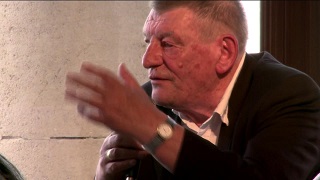
J. Bernlef (14 januari 1937 - 29 oktober 2012)
De Britse schrijver en journalist Edward St Aubyn werd geboren op 14 januari 1960 in Cornwall. Zie ook alle tags voor Edward St Aubyn op dit blog.
Uit: Never Mind
“At half past seven in the morning, carrying the laundry she had ironed the night before, Yvette came down the drive on her way to the house. Her sandal made a faint slapping sound as she clenched her toes to prevent it from falling off, and its broken strap made her walk unsteadily over the stony, rutted ground. Over the wall, below the line of cypresses that ran along the edge of the drive, she saw the doctor standing in the garden.
In his blue dressing gown, and already wearing dark glasses although it was still too early for the September sun to have risen above the limestone mountain, he directed a heavy stream of water from the hose he held in his left hand onto the column of ants moving busily through the gravel at his feet. His technique was well established: he would let the survivors struggle over the wet stones, and regain their dignity for a while, before bringing the thundering water down on them again. With his free hand he removed a cigar from his mouth, its smoke drifting up through the brown and grey curls that covered the jutting bones of his forehead. He then narrowed the jet of water with his thumb to batter more effectively an ant on whose death he was wholly bent.
Yvette had only to pass the fig tree and she could slip into the house without Dr Melrose knowing she had arrived. His habit, though, was to call her without looking up from the ground just when she thought she was screened by the tree. Yesterday he had talked to her for long enough to exhaust her arms, but not for so long that she might drop the linen. He gauged such things very precisely. He had started by asking her opinion of the mistral, with exaggerated respect for her native knowledge of Provence. By the time he was kind enough to show an interest in her sons job at the shipyard, the pain had spread to her shoulders and started to make sharp forays into her neck. She had been determined to defy him, even when he asked about her husbands back pains and whether they might prevent him from driving the tractor during the harvest. Today he did not call out with the ‘Bonjour, chère Yvette which inaugurated these solicitous morning chats, and she stooped under the low branches of the fig tree to enter the house.”
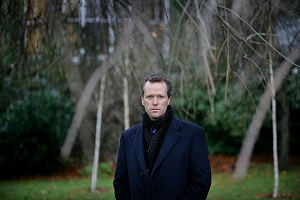
Edward St Aubyn (Cornwall, 14 januari 1960)
De Japanse schrijver Yukio Mishima werd geboren op 14 januari 1925 in Tokyo. Zie ook ook alle tags voor Yukio Mishima op dit blog.
Uit: The Sailor Who Fell from Grace with the Sea (Vertaald doorJohn Nathan)
“Real danger is nothing more than just living. Of course, living is merely the chaos of existence, but more than that it's a crazy mixed-up business of dismantling existence instant by instant to the point where the original chaos is restored, and taking strength from the uncertainty and the fear that chaos brings to re-create existence instant by instant. You won't find another job as dangerous as that. There isn't any fear in existence itself, or any uncertainty, but living creates it.”
(…)
“Suddenly the full long wail of a ship's horn surged through the open window and flooded the dim room - a cry of boundless, dark, demanding grief; pitch-black and glabrous as a whale's back and burdened with all the passions of the tides, the memory of voyages beyond counting, the joys, the humiliations: the sea was screaming. Full of the glitter and the frenzy of night, the horn thundered in, conveying from the distant offing, from the dead center of the sea, a thirst for the dark nectar in the little room.”
(…)
“The whole house is spic and span and everybody's supposed to be real honest and full of what he calls 'the good'. We even leave food out for the mice in the rafters so they won't have to sin by stealing. And you know what happens when dinner's over? Everybody hunches over and licks his place clean so none of God's grace will be wasted.”
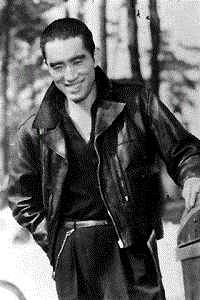
Yukio Mishima (14 januari 1925 - 25 november 1970)
De Chinese schrijfster Anchee Min werd geboren in Shanghai op 14 januari 1957. Zie ook alle tags voor Anchee Min op dit blog.
Uit: Empress Orchid
“My imperial life began with a smell. A rotten smell that came from my father’s coffin—he had been dead for two months and we were still carrying him, trying to reach Peking, his birthplace, for burial. My mother was frustrated. “My husband was the governor of Wuhu,” she said to the footmen whom we had hired to bear the coffin. “Yes, madam,” the head footman answered humbly, “and we sincerely wish the governor a good journey home.” In my memory, my father was not a happy man. He had been repeatedly demoted because of his poor performance in the suppression of the Taiping peasant uprisings. Not until later did I learn that my father was not totally to blame. For years China had been dogged by famine and foreign aggression. Anyone who tried on my father’s shoes would understand that carrying out the Emperor’s order to restore peace in the countryside was impossible—peasants saw their lives as no better than death. I witnessed my father’s struggles and sufferings at a young age. I was born and raised in Anhwei, the poorest province in China. We didn’t live in poverty, but I was aware that my neighbors had eaten earthworms for dinner and had sold their children to pay off debts. My father’s slow journey to hell and my mother’s effort to fight it occupied my childhood. Like a long- armed cricket my mother tried to block a carriage from running over her family. The summer heat baked the path. The coffin was carried in a tilted position because the footmen were of different heights. Mother imagined how uncomfortable my father must be lying inside. We walked in silence and listened to the sound of our broken shoes tapping the dirt. Swarms of flies chased the coffin.”
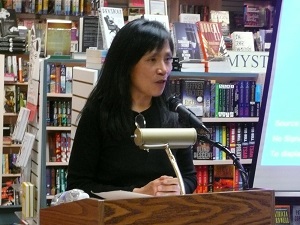
Anchee Min (Shanghai, 14 januari 1957)
De Nederlandse dichter en schrijver Isaäc da Costa werd geboren in Amsterdam op 14 januari 1798. Zie ook alle tags voor Isaäc da Costa op dit blog.
Israël en Nederland (Fragment)
Toen Isrel uit Egipten toog,
den wreeden slavendwang ontkomen,
toen liet de Zee haar diepten droog;
Jordaan! men zag u rugwaart stroomen!
toen daverde der bergen top
van schrik: de heuvlen sprongen op,
geljk een lammrenkude,
voor Palstinaas naadrend lot!
voor ’t aangezicht van Jacobs God
en de aarde beefde en schudde.
Tegenkeer..
Toen de Almacht tegen ’t Spaansch geweld
den kamp van Nederland bewerkt had,
en voor de Kerk, door Gods hersteld,
Oranjes heldenarm gesterkt had;
toen daverde geheel Euroop:
de stroom veranderde zijn loop
in Rhijn, en Seine, en Iber!
Hoe kromp Castieljes aartstiran!
Hoe schokte er Satans zetel van,
aan de oevers van den Tiber!
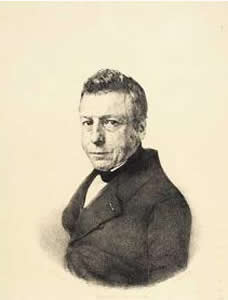
Isaäc da Costa (14 januari 1798 – 28 april 1860)
Portret doorAdrianus Johannes Ehnle, 1855
Zie voor nog meer schrijvers van de 14e januari ook mijn blog van 14 januari 2011 deel 2 en eveneens deel 3
14-01-2014 om 19:03
geschreven door Romenu 
Tags:J. Bernlef, Edward St Aubyn, Yukio Mishima, Anchee Min, Isaäc da Costa, Romenu
|

